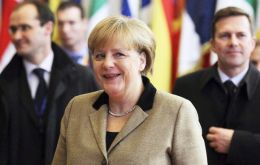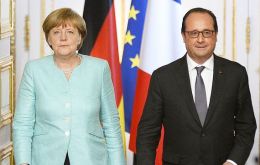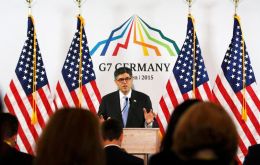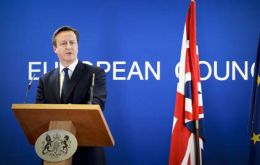MercoPress. South Atlantic News Agency
Tag: Germany
-
Thursday, August 20th 2015 - 07:07 UTC
Two lady leaders under fire, meet in Brazil hoping to recover ground

Chancellor Angela Merkel, Foreign Minister Frank-Walter Steinmeier and several other high-ranking German politicians touched down in Brazil's capital, Brasilia late Wednesday. The German delegation set off on its 12-hour flight immediately after a Bundestag vote approving a new bailout package for Greece.
-
Saturday, August 8th 2015 - 10:14 UTC
Germany rocked by debate on freedom of the press and government influence over the courts

Journalists have been accused of treason; a chief prosecutor fired; and we have witnessed the unedifying spectacle of government ministers scrambling to get out of the firing line after popular outrage. But the scandal rocking Germany's political establishment isn't about sleaze or corruption but rather whether a little-known website can publish documents already publicly discussed.
-
Wednesday, August 5th 2015 - 07:49 UTC
German Executive and Judiciary clash over freedom of the press: top prosecutor sacked

Germany's justice minister has sacked the country's top prosecutor, who had accused the government of interfering with a treason investigation. Heiko Maas said he no longer had confidence in Harald Range, dismissing his statements as “incomprehensible”.
-
Tuesday, July 7th 2015 - 07:21 UTC
Merkel and Hollande tell Greece the door for serious proposals remains open

France and Germany told Greece to come up with serious proposals in order to restart financial aid talks, raising pressure on Prime Minister Alexis Tsipras to compromise a day after his country voted overwhelmingly against more austerity
-
Saturday, May 30th 2015 - 08:51 UTC
US and Germany disagree about a world economy 'possible accident' if Greece collapses

The United States warned on Friday of a possible accident for the world economy if Greece and its creditors miss their June deadlines to avert a debt default. Germany said there was no sign of a breakthrough. The ongoing debate is taking place in Dresden, Germany in the framework of G7 Finance ministers and central bank chiefs meeting.
-
Wednesday, May 13th 2015 - 07:00 UTC
Cameron puts pressure on Europe for major changes and revamped links

Prime Minister David Cameron will hold an early referendum on membership of the European Union if he can first reach a deal that satisfies his demands for major changes in Britain's relationship with the bloc, his spokesman said yesterday.
-
Tuesday, April 14th 2015 - 11:19 UTC
Germany's greatest post WWII writer and Nobel Prize winner dies at 87

German novelist Günter Grass, the Nobel Prize-winning author of “The Tin Drum”, an epic treatment of the Nazi era, on Monday at the age of 87, his publishers said. A broad-shouldered man with a drooping mustache, Grass spurned the German tradition of keeping a cool intellectual distance, insisting that a writer's duty was to be at the frontline of moral and political debate.
-
Wednesday, March 18th 2015 - 08:20 UTC
EU main economies announce plans to join China-led development bank, despite US warning

France, Germany and Italy on Tuesday announced plans to join the Chinese-led development bank AIIB, drawing concern in Washington which views the institution with skepticism. The three European countries want ”to become founding members of the Asian Infrastructure Investment Bank (AIIB)”, they said in a statement.
-
Thursday, March 12th 2015 - 00:12 UTC
Greece demands reparations from Germany for Nazi occupation crimes, loan and destruction

The Greek government has threatened to seize German property as compensation for a Nazi atrocity in World War Two. Justice Minister Nikos Paraskevopoulos said he was ready to approve a Supreme Court ruling from 2000 backing payment to relatives of the 218 victims.
-
Monday, March 2nd 2015 - 06:21 UTC
Germany sells five-year notes in Euros at a negative yield of -0.08%

The German government sold five-year notes at a negative yield for the first time in its history on Wednesday. The milestone comes as the European Central Bank prepares to begin a bond-buying program, known as quantitative easing, in hopes of stimulating growth in economies across the Continent.
